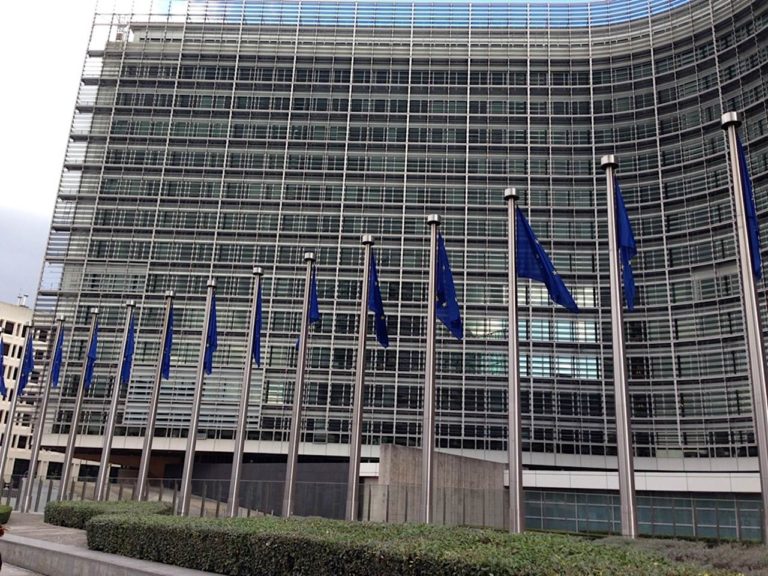Highlights from the Past Week
CW 6 / Monday, 7 to Thursday, 10 February: Political Group and Committee Meetings Week (Brussels);
EUROPEAN CHIPS ACT – EU COMMISSION PRESENTS PACKAGE PROPOSAL: Last Tuesday, the European Commission presented its proposal for a Chips Act in its bid to take a further step towards “digital sovereignty”. The package contains a mix of legislative and non-legislative initiatives to upscale production capacity, relax state aid rules, invest in research, and establish international partnerships. (see COM press release)
The Chips Act introduces the concept of “first-of-a-kind” facilities. These are fabrication facilities designed to significantly advance the level of technology and support the European semiconductor supply chain. In the event of a crisis, the Commission can request relevant information from facilities or other chip manufacturers for a specific type of product. In the meantime, the EU executive has presented a toolbox to address the current global shortage.
The proposal also includes pilot lines to facilitate the introduction of new technologies and a virtual platform to help companies and researchers develop advanced microchips. With regard to the funding, however, it comes down to the renaming of existing funds as well as desired private investment. (see Euractiv)
ARTIFICIAL INTELLIGENCE I – NEW COUNCIL PROPOSAL: The French Presidency’s partial compromise text (PDF) on Articles 16-29 of the AI Act was circulated in the EU Council this week. The amendments include more extensive obligations for providers of high-risk AI systems, in particular in terms of transparency, traceability, documentation, and cooperation with users. At the same time, the exemption for credit institutes has been watered down.
The new measures also clarify the obligations of third-party providers and how liability is allocated across the value chain. Furthermore, additional responsibility has been introduced for the authorised representatives of non-EU providers so that they are jointly liable for defective systems. The compromise text also clarifies the obligations of importers and distributors and adds an obligation for qualified human oversight for users.
ARTIFICIAL INTELLIGENCE II – EP SPECIAL COMMITTEE REPORT: If French Secretary of State for Digital Affairs Cedric O holds sway, facial recognition could derail the AI Act. He stated that, in the field of intelligence or the maintenance of public order, there were elements that fell under the sovereignty of states. In his opinion, the concept of facial recognition hinders the debate concerning which protocols are really risky and which do not pose problems. More generally, the French representative advocated for finding a balancing act between innovation and regulation in the future regulation.
Meanwhile, the rapporteurs are working on compromises for the report of the AI Special Committee. Articles 1 to 8 and most of the articles from 9 to 26 of the draft report by A. Voss (EPP) have been finalised. The vote is scheduled for 22 March.
PEGASUS SPYING SOFTWARE – EUROPEAN PARLIAMENT INITIATES INQUIRY: The European Parliament will launch an enquiry into the Pegasus spying scandal after it emerged last year that governments had used technology from Israeli company NSO Group to monitor the phones of politicians, activists and journalists around the world. At the suggestion of the Liberal Renew parliamentary group, a committee of inquiry will now be launched to investigate allegations of surveillance of government critics. (see The Guardian)
A debate on the matter will take place in plenary on Tuesday.
DIGITAL MARKETS ACT I – PROGRESS IN NEGOTIATIONS: Negotiators on the DMA are making slow but steady progress ahead of the third trilogue scheduled for 1 March, reports Politico Pro (paywall). While technical meetings will continue this week on Tuesday and Friday, the latest four-column document (PDF) shows that the Council and Parliament have reached agreement on at least marginal topics.
For example, the compliance obligations for gatekeepers (Article 7) were updated and a clarification of the information obligation on mergers under Article 12 was added, which now becomes a relevant indicator.
In Article 18 (opening of proceedings), the negotiators have inserted an authorisation for the Commission to “exercise its powers of investigation against infringements before opening proceedings”. Their powers have also been strengthened in Article 19 (requests for information as part of investigation and monitoring powers).
Meanwhile, EP rapporteur Schwab reported in committee that while a large part of unproblematic points had been settled, what the Council Presidency has offered so far is far from the Parliament’s expectations on the Digital Markets Act. He added that the Parliament should not be too optimistic, and there is still a lot of work ahead of the negotiating teams. (video of the IMCO meeting)
DIGITAL MARKETS ACT II – FURTHER CALLS FROM THE US: As the Financial Times reports (paywall), a letter from the Biden cabinet has been received by the EU Parliament’s rapporteur, A. Schwab. The FT reports that the letter was signed by Arun Venkataraman, counselor to US Commerce Secretary Gina Raimondo.
He has “concerns surrounding the implementation period for this complex regulation” and asks the EU to find implementation criteria that do not discriminate against US companies.
FREQUENCY SPECTRUM – EU COMMISSION APPROVES EXPANSION OF 5G BAND: The Commission has announced that the frequency bands available for 5G are to be expanded. The process has already started in some EU countries, with the decision intended to provide harmonisation across the Union.
However, the two possible options are not without controversy. Releasing the already allocated bandwidth would require phasing out 2G and 3G networks, but this is being resisted, as there are still existing applications which rely on these networks, such as smart meters, eCalls and alerts for natural disaster. The 6 GHz band could also be allocated, but this would prevent it from being used for Wi-Fi networks, which are already in use in the most densely populated areas. (see Euractiv)
COMMON CHARGERS – EP IN FAVOUR OF EXTENDING THE SCOPE: With his calls for a wider scope in the EU’s plans to introduce common chargers and for the Commission to move towards similar harmonisation for wireless devices by 2025, the rapporteur A. Agius Saliba appears to have the support of the shadow rapporteurs. (video of the IMCO meeting)
Although Saliba’s text proposes a broader scope of devices that includes e-readers, low-powered laptops, keyboards, mouse devices, earphones, smartwatches and electronic toys, some parts of the European Parliament want to go further. R. Thun (Renew) said the Parliament “should aim to cover all small and medium electronic devices unless there are some safety implications”.
While the Parliament is still considering revising its own text, the Council recently adopted its position, keeping the scope originally set by the Commission.
Amendments to the Saliba report must be submitted by 15 February, with a committee vote scheduled for 20 April. (see Politico Pro, paywall)
HATE ON THE INTERNET – FRANCE’S PROPOSAL FOR EUROPEAN CRIMINAL OFFENCE: After the EU Justice Ministers had expressed positive views at their most recent meeting on adding hate crimes and hate speech to the list of “Eurocrimes”, France has now submitted an amended text proposal to be discussed in the Working Party on Fundamental Rights, Citizens’ Rights and Free Movement. The document was leaked by Contexte (paywall, FR) (find the PDF here).
COMMON DATA USE – EU COMMISSION TO PRESENT PROPOSAL FOR VEHICLE DATA: The European Commission will again present a proposal for sector-specific legislation on access to vehicle data. According to a document (PDF) published late on Wednesday, it wants to present the rules by the end of the year.
In advance, a public consultation on the regulation is to be launched before the end of March; this is reported by Politico Pro (paywall) from the work programme recently presented by DG GROW. As stated in the document, the new rules would also cover “the possibility to send data to the vehicle (dashboard and routines), software/cybersecurity management, including for replacement parts, new categories of autonomous vehicles [and] replacement batteries”.
FRANCE – GDPR VIOLATION THROUGH USE OF GOOGLE ANALYTICS: In the wake of Austria’s decision, France has also now made its decision on transatlantic data exchange. The French data protection authority CNIL has ruled that the use of US website analytics services (such as Google Analytics) violates the General Data Protection Regulation (GDPR), as data is transferred to the US. The CNIL now ordered the website operator to “bring this processing into compliance with the GDPR, if necessary by ceasing to use the Google Analytics functionality (under the current conditions)”.
UNITED KINGDOM – AGE VERIFICATION ONLINE: The UK government has announced that commercial porn providers will in future be forced to use technology such as age verification to prevent children from accessing their websites. The new safeguards are part of a tougher Online Safety Bill that will impose heavy fines on tech companies if they fail to protect their users from harm.
An earlier draft of the bill only provided for duty of care on content transferred from user to user on social media platforms such as Twitter and Facebook, and campaigners have long urged ministers to broaden the scope of the legislation.
Relevant Publications, including from the EP Think Tank:
- Digital Markets Act (Briefing)
- A common charger for electronic devices: Revision of the Radio Equipment Directive; EU Legislation in Progress (Briefing)
- Common chargers – Revision of the Radio Equipment Directive; Initial Appraisal of a European Commission Impact Assessment (Briefing)
- Improving the working conditions of platform workers (Briefing)
Outlook for the Coming Week
You can find a list of the upcoming dates of the European Parliament here as well as an overview of the plenary sessions week. A debate on surveillance involving cyber-surveillance software will take place on Tuesday morning. The provisional meeting calendar for 2022 can be found here (PDF).
An overview of the most important dates of the Council week can be found here, the meeting calendar is accessible here, and the list of the main topics for the coming 14 days is available here, while an indicative calendar of meetings of the French Presidency Council can be found here (PDF).
Included among these dates are:
Summit and Ministry Meetings:
- Informal Meeting of Trade Ministers, Sunday, 13 and Monday, 14 February;
- Informal Meeting of Ministers for Work, Employment and Social Affairs, Monday, 14 and Tuesday, 15 February;
- Informal Meeting of European Ministers Responsible for Space, Wednesday, 16 February;
- European Union – African Union Summit, Thursday, 17 and Friday, 18 February;
Preparatory Bodies:
- Audiovisual Working Party, Monday, 14 February;
- Working Party on Telecommunications and Information Society (incl. European Declaration on Digital Rights and Principles, TTC), Monday, 14 February;
- Working Party on Competition, Monday, 14 February;
- Working Party on Competitiveness and Growth (Industry) (incl. Chips Act), Monday, 14 February;
- Working Party on Competitiveness and Growth (Internal Market), Monday, 14 February and Wednesday, 16 February;
- Horizontal Working Party on Cyber Issues (incl. NIS2), Tuesday, 15 February;
- Working Party on Cooperation in Criminal Matters (COPEN), Tuesday, 15 February;
- Consumer Affairs and Information Working Party (incl. Directive on General Product Safety), Wednesday, 16 February;
- COREPER I (incl. DSA), Wednesday, 16 February;
- COREPER II, Monday, 14 and Wednesday, 16 February;
Information about the weekly Commission meeting can be found in the preview (PDF) or (at short notice) in the current agenda. Topics of particular relevance include the Data Act (23 February), the legislative proposal against child abuse (now rescheduled for 30 March), and the Media Freedom Act (29 June).
The following topics are on the agenda for the coming week:
- Defence package
- Communication on the Commission’s contributions to Europe’s security and defence
- Roadmap on critical technologies for security and defence
- Space package
- EU strategy for space traffic management
- Building an EU space-based global secure communication system
You can find the judicial calendar of the ECJ here. There will essentially be no meetings from 14 to 20 February due to the court recess.
European Parliament Committees
CW 7 / Monday, 14 to Thursday, 17 February: Plenary Sessions Week (Strasbourg);
LIBE Committee (EP)
Current Meetings
- Monday, 14 February 2022, 20.00-21.00 (Strasbourg)
- Tuesday, 15 February 2022, 10.00-11.00 (Strasbourg)
Excerpt from the Draft Agenda
The meetings deal exclusively with votes on topics which are not directly related to the Internet industry.
Further Meetings (Calendar)
- Wednesday, 16 March 2022, 9.00-12.00 and 13.45-15.45 (Brussels)
- Thursday, 17 March 2022, 9.00-12.00 and 13.45-15.45 (Brussels)
JURI Committee (EP)
Current Meetings
- None
Further Meetings
- Monday, 28 February 2022, 13.45-15.45 (Brussels)
- Monday, 14 March 2022 (Brussels)
Dossiers Timetable (9 February 2022)
ITRE Committee (EP)
Current Meetings
- None
Further Meetings (Calendar)
- Thursday, 3 March 2022, 9.00-12.00 (Brussels)
Dossiers Timetable (8 February 2022)
IMCO Committee (EP)
Current Meetings
- None
Further Meetings (Calendar)
- Monday, 28 February 2022, 13.45-16.15 and 16.45-18.45 (Brussels)
Dossiers Timetable (February 2022)
CULT Committee (EP)
Current Meetings
- None
Further Meetings (Calendar)
- Monday, 14 and Tuesday, 15 March 2022 (Brussels)
AIDA Committee (EP) – Special Committee on Artificial Intelligence in a Digital Age
Current Meetings
- None
Further Meetings (Calendar)
- Tuesday, 22 March 2022, 9.00-12.00 (Brussels)
INGE (EP) – Special Committee on Foreign Interference in all Democratic Processes in the European Union, including Disinformation
Current Meetings
- None
Further Meetings (Calendar)
- Open
Further Scheduled Parliamentary Calendar Dates
- CW 8 / Monday, 21 to Thursday, 24 February: Green Week (no meetings);
- CW 9 / Monday, 28 February to Thursday, 3 March: Policy Group and Committee Meetings Week (Brussels);
- CW 10 / Monday, 7 to Thursday, 10 March: Plenary Sessions Week (Strasbourg);




